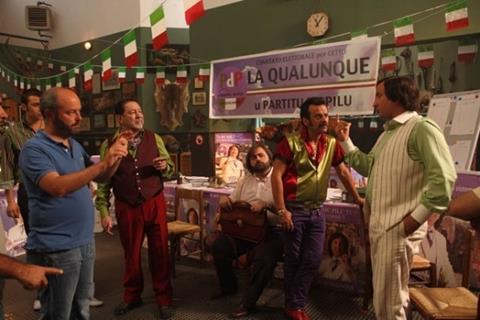Dir: Giulio Manfredonia. Italy. 2011. 96 mins

Watching this broad political comedy in a provincial Italian multiplex, complete with texting teenagers in the front row, it takes a while for the brilliant savagery of the satire to hit home. But by the end it’s clear why the Berlinale selectors felt moved to give Whatsoeverly (Qualunquemente) a berth in the festival’s Panorama section.
The audience’s fascinated horror is directed not just at this grotesque mockery of a politician but also at our own grudging admiration of his barefaced audacity.
Because for all its common touch – and perhaps all the more effectively because of its common touch - this parable of the rise to power of a corrupt and unashamedly self-serving southern Italian politician outdoes Nanni Moretti’s convolutedly intellectual Il Caimano in its analysis of the moral bankruptcy of politics, and the trivialising of the democratic debate, in Berlusconi’s Italy.
Although he has crossed over into auteur cinema more than once – most prominently in his utterly straight role as a worker and husband unhinged by redundancy in Silvio Soldini’s Days and Clouds – star Antonio Albanese is best known in Italy as an edgy TV comedian, and the film’s featured character of sleazy Mafia-linked Calabrian politician Cetto La Qualunque was developed on a couple of popular TV shows.
This, and the lucky timing of the latest Berlusconi sex scandal should help Whatsoverly live up to its ambitious 600-screen rollout on home ground. With its local references and difficult-to-translate dialect quips and word games, it’s much more of a niche prospect outside of Italy, where the arthouse crowd that normally stumps up for foreign films is likely to find its commercial Italian comedy genes a little distracting. Marketing focus on the sheer sleaze-power of Albanese’s memorable character could be the answer.
Aping the style of artsy mob movies, the opening scene shows a cupola of shadowy Mafia bosses sorting through candidates for their man on the local political scene before settling on Cetto La Qualunque (Albanese) – a plump, greasy, floppy-fringed local property developer with a knack for adverbial solecisms (the non-word that gives the film its title being one), who was forced into Latin American exile after a brush with the law.
Called back from his Caribbean hideout, La Qualunque (a just about credible southern Italian surname that literally translates as ‘The Whatever’) returns to Calabria with a leggy Cuban mistress (Da Silva) that he refers to as Cosa (‘Thing’) and a mulatto daughter whose name he can’t even remember – both of whom he promptly imposes on Carmen (Indovina), the catty trash-princess wife he left at home.
He’s shocked to discover how things have gone to the dogs since his departure: work on the illegal beachside campsite he owns has been stopped just because of some old Etruscan ruins that were found there, his milksop son Melo (Giordano) is besmirching his father’s name by wearing a helmet when he rides his motorbike, and worst of all, the leading candidate in the town’s forthcoming mayoral elections, De Santis, is running on an anti-corruption platform. It takes little persuasion for La Qualunque to enter the mayoral race, and he’s soon running on the dialect slogan “Più pilu pi tutti” (“more muff for all”).
Although some of its characters are little more than low-grade caricatures, what keeps the film from sliding into comedy cliché is the menace-laced Machiavellian energy of Albanese’s character, whose amorality, sexism and crass egotism (as when he gets annoyed with a priest who insists on saying Mass while he’s trying to talk on his phone) are critiqued by being given full rein.
So the audience’s fascinated horror is directed not just at this grotesque mockery of a politician but also at our own grudging admiration of his barefaced audacity. In this character, Albanese is channeling a degraded but still recognisable version of an anarchic Southern life force that still has purchase in Mediterranean life, tourism and politics.
Not everything works. The film takes a while to cast off its popcorn-comedy origins, and the image-consultant and spin-doctor character played by Sergio Rubini is too studied and actorly to sit comfortably with the cartoonish verve of the rest of the film and cast. But we forget and forgive for the sake of a handful of classic comic scenes – best of all a TV debate between the two candidates in which a clearly biased (and probably bribed) presenter indulges La Qualunque’s use of jokes, insults, sexual innuendo and irresponsible electoral tax-cutting promises in response to his earnest opponent’s doomed attempts to engage with policies.
Whatsoverly’s kitschy Southern Italian pop soundtrack by Banda Osiris and its spot-on production design and costumes underline the film’s message. The town of Marina di Sopra is a jerry-built cement jungle, La Qualunque’s villa a crass triumph of Jacuzzis and busts of Roman emperors, and the colour palette full of jarringly bright hues that converge slowly on the sickly purple – Cetto’s campaign colour – that dominates the final scenes.
Production companies: Fandango, Rai Cinema
International sales: Fandango Portobello Sales, www.fandangoportobello.com
Producer: Domenico Procacci
Screenplay: Antonio Albanese, Piero Guerra
Cinematography: Roberto Forza
Production designer: Marco Belluzzi
Editor: Cecilia Zanuso
Music: Banda Osiris
Website: www.partitodupilu.it
Main cast: Antonio Albanese, Sergio Rubini, Lorenzo Indovina, Nicola Rignanese, Davide Giordano, Veronica da Silva















![[L-R]: Amanda Villavieja, Laia Casanovas, Yasmina Praderas](https://d1nslcd7m2225b.cloudfront.net/Pictures/274x183/6/4/1/1471641_pxl_20251224_103354743_618426_crop.jpg)





